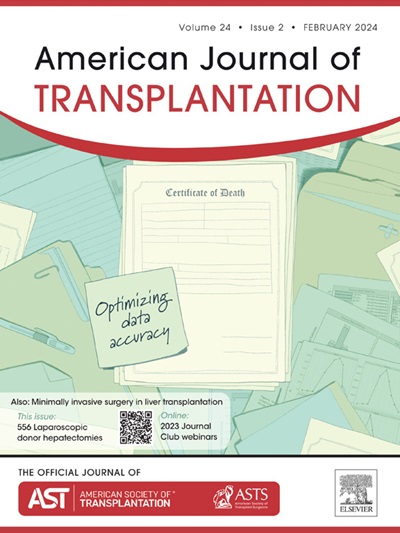Epigenetically modulating macrophage subpopulations to promote long-term allograft survival in a mouse heart transplant model
IF 8.2
2区 医学
Q1 SURGERY
引用次数: 0
Abstract
Despite much-improved protocols that broadly suppress the adaptive immune cells, most allografts are still lost to chronic rejection, in which macrophages have been prominently featured in the graft. In both clinical and preclinical studies, the graft-infiltrating macrophages often acquire diverse effector activities, especially the M2-biased programs, to mediate graft damage. But the precise mechanisms that regulate such programs remain incompletely defined. In the present study, we took a genome-wide approach to profile the epigenomic changes of M2 polarized macrophages and uncovered bromodomain and extraterminal domain family protein-4 (BRD4) as a critical epigenetic regulator of M2 cells. Further in vitro studies revealed that either blocking BRD4 using a chemical inhibitor or conditional deletion of Brd4 in myeloid cells profoundly inhibited the induction of M2 cells. Moreover, in a fully major histocompatibility complex–mismatched heart transplant model, in which treatment with cytotoxic T lymphocyte antigen-4 Ig fusion protein led to the development of chronic rejection, inhibition of BDR4 in transplant recipients resulted in long-term heart allograft survival, which was associated with diminished intragraft M2 cells and absence of histologic features of chronic rejection. Together, our data suggest that macrophages can be epigenetically modified in favor of transplant survival and that BRD4 seems a promising therapeutic target for blocking chronic allograft rejection.
在小鼠心脏移植模型中,表观遗传学调节巨噬细胞亚群促进同种异体移植物的长期存活。
尽管广泛抑制适应性免疫细胞的方案得到了很大的改进,但大多数同种异体移植物仍然失去了慢性排斥反应,其中巨噬细胞在移植物中占有显著地位。在临床和临床前研究中,移植物浸润的巨噬细胞经常获得不同的效应活性,特别是m2偏向程序,介导移植物损伤。但调控此类项目的确切机制仍未完全确定。在本研究中,我们采用全基因组方法分析了M2极化巨噬细胞的表观基因组变化,发现溴域和外端结构域家族蛋白-4 (BRD4)是M2细胞的关键表观遗传调控因子。进一步的体外研究表明,在髓细胞中使用化学抑制剂阻断BRD4或有条件地删除BRD4均可显著抑制M2细胞的诱导。此外,在完全mhc错配的心脏移植模型中,CTLA-4Ig治疗导致慢性排斥反应的发展,移植受体抑制BDR4导致移植心脏长期存活,这与移植体内M2细胞减少和慢性排斥的组织学特征缺失有关。总之,我们的数据表明巨噬细胞可以被表观遗传修饰,有利于移植存活,并且BRD4似乎是阻断慢性同种异体移植排斥反应的有希望的治疗靶点。
本文章由计算机程序翻译,如有差异,请以英文原文为准。
求助全文
约1分钟内获得全文
求助全文
来源期刊
CiteScore
18.70
自引率
4.50%
发文量
346
审稿时长
26 days
期刊介绍:
The American Journal of Transplantation is a leading journal in the field of transplantation. It serves as a forum for debate and reassessment, an agent of change, and a major platform for promoting understanding, improving results, and advancing science. Published monthly, it provides an essential resource for researchers and clinicians worldwide.
The journal publishes original articles, case reports, invited reviews, letters to the editor, critical reviews, news features, consensus documents, and guidelines over 12 issues a year. It covers all major subject areas in transplantation, including thoracic (heart, lung), abdominal (kidney, liver, pancreas, islets), tissue and stem cell transplantation, organ and tissue donation and preservation, tissue injury, repair, inflammation, and aging, histocompatibility, drugs and pharmacology, graft survival, and prevention of graft dysfunction and failure. It also explores ethical and social issues in the field.

 求助内容:
求助内容: 应助结果提醒方式:
应助结果提醒方式:


